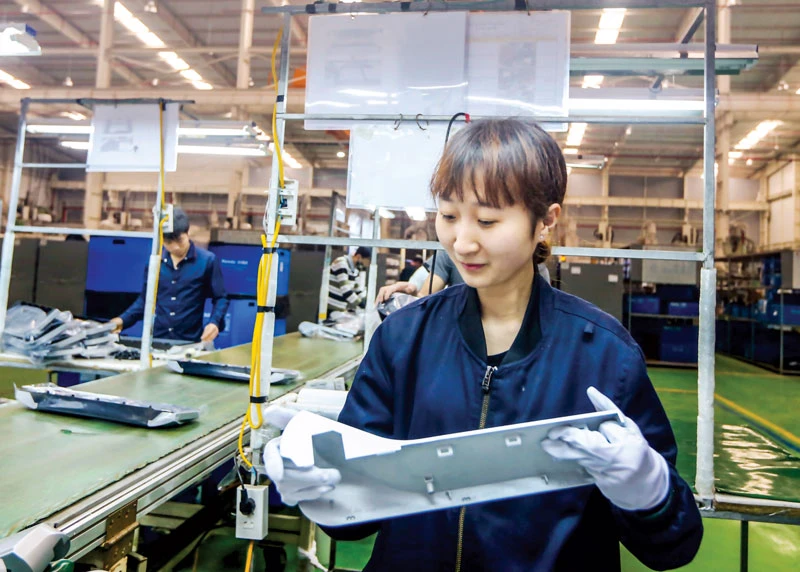
New global situation
The current pandemic has created situations worldwide whereby rising protectionism is widening the gap between the rich and poorer countries, between regions within countries and also between local residents. Vietnam too has been affected in many ways. The Covid-19 pandemic has led to the GDP in the first quarter of the year to increase only by 3.82%. The International Monetary Fund (IMF) has predicted that Vietnam’s annual GDP in 2020 would rise by barely 2.7%, affected greatly by the closure of tens of thousands of companies and loss of millions of jobs. Nevertheless, notwithstanding all negative factors, Vietnamese business companies as well as the national economy have shown great resilience, which has not fallen into a recession and is still maintaining a positive growth rate.
The current fight against the Covid-19 pandemic is being successfully fought by Vietnam, with the country’s history of resilience in maintaining political security. Vietnam has kept a close watch on the safety of its people while maintaining economic security, safety for all its investors and has continued to improve the present economic environment for further investments. Vietnam now has more advantages in attracting Foreign Direct Investments (FDIs). Investors across Asia, Europe and the USA are considering Vietnam a safer place for new investment projects and are willing to move their entire manufacturing factories from other countries into Vietnam.
Companies relocating
The unusual and difficult situation caused by the outbreak of the Covid-19 pandemic has prompted both Japan and the USA to encourage and provide financial support to companies that wish to relocate their facilities from China back to their homeland. This is a reason why we should not pin too much hope on big foreign companies moving into Vietnam. China is the second biggest economy in the world with a population of 1.4 bn people that offer a huge advantage, besides China has advanced technology and large-scale businesses. Even though Japan and the USA are using the present situation to exert pressure tactics on companies, only a few of these companies are considering relocating from China, and a larger number of these big companies are still trying to find ways to continue to stay there. Vietnam is attracting only a few of these companies.
Recent information shows that several multinationals have reached an agreement with the Ministry of Planning and Investment in Vietnam as well as with some cities and provinces in the country for relocating their factories from China and other countries. These multinationals each have investment capital of tens of billions of US dollars. The US giant Apple Inc., for instance, has planned to move its production facilities from China to Vietnam to produce 30% of its wireless earphones for export.
The Japanese company Panasonic Corporation wants to move all its air conditioning, refrigerator and washing machine production units from Thailand to Vietnam. A Taiwanese representative group has met with Vietnamese officials in the northern province of Bac Giang to arrange for its high-tech project with an investment capital of USD 4 bn. The People’s Committee of Bac Giang Province has proposed to the Government to allow the construction of a 500ha Industrial Park to meet the needs of such future investors.
However, it should be noted that Vietnam is not the only attractive market at the moment. Some countries have appeared as new competitors for this move. For example, India with an advantage of more than 1.3 bn people, also offers the world’s biggest number of graduate engineers every year and an advanced information technology network. Recently India has offered a large land area accompanied with significant incentives to house almost 1,000 big FDI companies. Similarly, Indonesia, with a population approximately three times that of Vietnam and GDP of around USD 1,000 bn, has started construction of a 400ha Industrial Park with several incentive offers for FDIs.
Therefore, it is necessary to be cautious about foreign companies, but it is vital to see this as a great opportunity for Vietnam. The country now needs to adopt appropriate policies and measures so as not to miss any good opportunity coming its way. It is essential to remember that FDIs are drivers of substantial growth, and together with private and state-owned businesses will help in speeding economic recovery and development. Vietnam aims for an annual GDP growth rate of about 5%, and to gather momentum for a growth rate of over 7% in 2021.
Offer favorable business environment
On 22 May, Prime Minister Nguyen Xuan Phuc chaired a strategic meeting to discuss measures for attracting more new FDIs. In addition to the current incentives offered for digital, high-tech and modern service projects, Vietnam will also create more support programs. Vietnam already has clear land areas, fully operational Industrial Parks (IP), as well as Economic Zones (EZ) on immediate offer to FDIs.
Nevertheless, it is essential to have more IPs in relevant provinces and offer fair and competitive rent fees. Several IPs and EZs in Vietnam have access roads and internet services, 3G and 4G telecommunications, electricity supply, water supply and drainage systems. The existing infrastructure is capable of satisfying investor needs. Beside this, Vietnam needs to meet the need of high-quality human resources with labor costs much lower than other competing countries.
When companies move operating factories from other countries into Vietnam, the Vietnamese Government should introduce regulations that do not allow import of old and second hand machinery and equipment. Owners of companies must be informed and required to strictly comply with regulations on environmental protection, gas emissions, noise pollution, fire safety and prevention, and offer high standards of health and safety facilities.
If a company or firm seriously violates any of the regulations or requirements, competent agencies may inspect and promptly take action to improve the situation. Since most FDI companies export 100% of their products, it is important to introduce appropriate amendments to regulations for export processing enterprises to create a more favorable business environment.




















